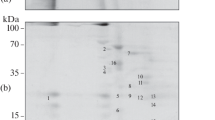Abstract.
The low molecular weight (LMW) heat shock protein (HSP), HSP16.6, in the unicellular cyanobacterium, Synechocystis sp. PCC 6803, protects cells from elevated temperatures. A 95% reduction in the survival of mutant cells with an inactivated hsp16.6 was observed after exposure for 1 h at 47°C. Wild-type cell survival was reduced to only 41%. HSP16.6 is also involved in the development of thermotolerance. After a sublethal heat shock at 43°C for 1 h and subsequent challenge exposure at 49°C for 40 min, mutant cells did not survive, while 64% of wild-type cells survived. Ultrastructural changes in the integrity of thylakoid membranes of heat-shocked mutant cells also are discussed. These results demonstrate an important protective role for HSP16.6 in the protection of cells and, in particular, thylakoid membrane against thermal stress.
Similar content being viewed by others
Author information
Authors and Affiliations
Additional information
Received: 14 October 1999 / Accepted: 16 November 1999
Rights and permissions
About this article
Cite this article
Lee, S., Owen, H., Prochaska, D. et al. HSP16.6 Is Involved in the Development of Thermotolerance and Thylakoid Stability in the Unicellular Cyanobacterium, Synechocystis sp. PCC 6803. Curr Microbiol 40, 283–287 (2000). https://doi.org/10.1007/s002849910056
Issue Date:
DOI: https://doi.org/10.1007/s002849910056




